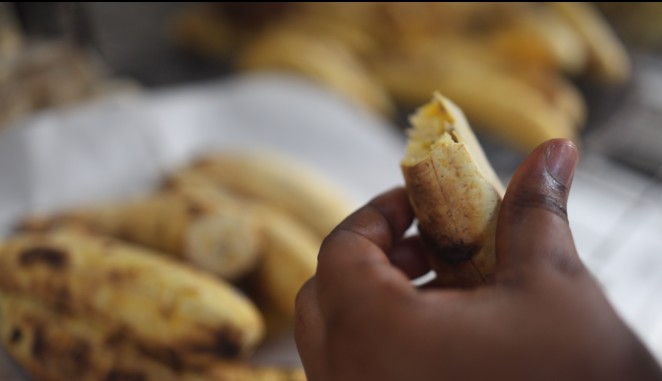As the world marks World Food Day, Ghanaians are feeling the bite of rising food costs, even in the simplest meals once meant for the poor. "Kofi Brokeman", the beloved roasted plantain and groundnut combo has become a luxury for many who once depended on it as an affordable snack.
Edith, from the University Relations Office at KNUST, had been craving roasted plantain for months after enjoying other Ghanaian favourites like jollof rice. When she finally decided to buy some, she couldn’t believe how pricey it had become.
At the KNUST campus, Alice, a roasted plantain vendor, shared her frustration.
“Last year, I sold roasted plantain for three cedis and groundnut for one cedi,” she said. “Now it’s five cedis, and even children with two cedis can’t afford it. If you don’t have money, you simply can’t buy.”
She explained that the cost of getting plantain keeps rising.
“About four fingers of plantain now cost between forty and fifty cedis,” Alice said. “If you don’t bargain carefully, you’ll run at a loss.”
Once the go-to meal for anyone low on cash, Kofi Brokeman has ironically become too expensive for the “broke man.”
To understand why, we turned to Professor Camillus Abawiera Wongnaa, an agricultural economist at KNUST.
“The plantain itself has become very expensive,” he explained. “It’s not cultivated in Kumasi or Accra, so traders travel long distances to get it. Transport costs, fuel prices, and vehicle maintenance all add up, and that cost is passed on to consumers.”
Professor Wongnaa noted that shrinking farmland and changing agricultural choices have worsened the situation.
“More land is being used for housing and estate development,” he said. “Farmers in the Bono and Ahafo regions are shifting from food crops like plantain and cassava to tree crops such as cashew, mango, and cocoa. When the trees mature, their canopy prevents farmers from growing plantain underneath. So supply drops while demand stays high, and prices rise.”
Even though Ghana’s overall inflation rate is easing, food inflation remains high, keeping "Kofi Brokeman" off the poor man’s table.
“What used to be a quick, cheap bite now surprises even me,” Professor Wongnaa said with a laugh. “A vendor told me, ‘If you came two weeks ago, it would’ve cost even more.’”
Still, for some, the love for Kofi Brokeman outweighs the cost.
“Regardless of the price, I’ll still buy it because I like it,” said Kwabena, a student who swears by the snack after evening lectures.
The way forward
According to Professor Wongnaa, addressing the rising cost of plantain and other staples requires rethinking how agriculture is viewed and supported.
“The best we can do is to educate the youth to see how good agriculture is,” he said. “So, if people are going into tree crops, we should also have others going into arable crops. We really need to change the paradigm and the way people see agriculture today so that more people come on board.”
He also called for attention to the cost and availability of farm inputs.
“From the supply side, most inputs are very expensive, and many of these are imported. We should ask ourselves, is it possible to produce some locally?” he suggested.
On land use, he urged a stronger national plan to protect agricultural land from being taken over by estate developments.
“Now, agricultural lands are going into estates,” he cautioned. “Is it possible we can plan our country so that, under no circumstance, should key agricultural lands be allocated for estate development?”
Still, for some, the love for Kofi Brokeman outweighs the cost.
“Regardless of the price, I’ll still buy it because I like it,” said Kwabena, a student who swears by the snack after evening lectures.
As Ghana joins the world to reflect on food systems this World Food Day, the story of Kofi Brokeman reminds us that safeguarding food security begins with how we value agriculture, protect our lands, and inspire the next generation to farm.
Story by: Emmanuel Kwasi Debrah (URO)

















